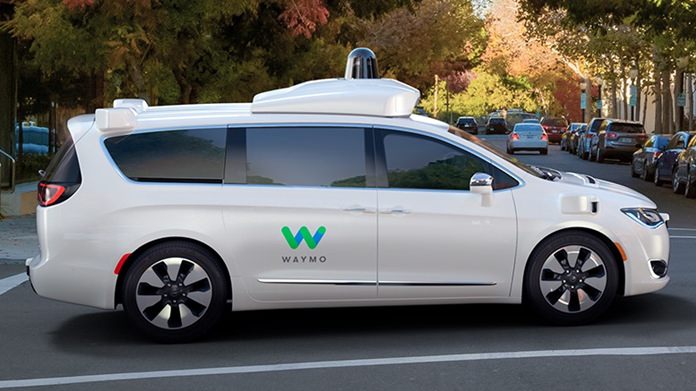
Detroit (AP) – A self-driving car company created by Google is pulling the human backup driver from behind the steering wheel and will test vehicles on public roads with only an employee in the back seat.
 The move by Waymo started Oct. 19 with an automated Chrysler Pacifica minivan in the Phoenix suburb of Chandler, Arizona. It’s a major step toward vehicles driving themselves without human backups on public roads. The company also said it would launch a ride service to compete with Uber and Lyft.
The move by Waymo started Oct. 19 with an automated Chrysler Pacifica minivan in the Phoenix suburb of Chandler, Arizona. It’s a major step toward vehicles driving themselves without human backups on public roads. The company also said it would launch a ride service to compete with Uber and Lyft.
Waymo, which is owned by Google’s parent company Alphabet, is in a race with other companies including Delphi, General Motors, Intel, Uber, Apple and Lyft to bring autonomous vehicles to the public. The companies say the robot cars are safer than human drivers because they don’t get drowsy, distracted or drunk.
Google has long stated its intent to skip driver-assist systems and go directly to fully autonomous driving. The Waymo employee in the back seat won’t be able to steer the minivan, but like all passengers, will be able to press a button to bring the van safely to a stop if necessary, Waymo said.
Within a “few months,” the fully autonomous vans will begin carrying volunteer passengers who are now taking part in a Phoenix-area test that includes use of backup drivers.
The company says the self-driving ride service will be the first application of the technology.
“We want the experience of traveling with Waymo to be routine, so you want to use our driver for your everyday needs,” Waymo CEO John Krafcik said prepared remarks announcing the test Tuesday at a conference in Portugal.
The company intends to expand the testing to the entire 600-square-mile (1,500-square-kilometer) Phoenix area and eventually bring the technology to more cities around the world. It’s confident that its system can handle all situations on public roads without human intervention, Krafcik said.
“Our system runs thousands of checks on itself every second,” he said. “With these checks, our systems can instantly diagnose any problems and pull over or come to a safe stop if needed.”
The company also says it has redundant braking, steering, power and computing systems so it never has to rely on a human driver.
Waymo wouldn’t say how many vehicles will be in the initial test or exactly how wide an area it will cover. The test will take place in a small area at first, then spread to portions of five cities and 100 square miles (260 square kilometers) in the Phoenix area. Eventually it will go to whole metro area.
The company also wouldn’t say how many minivans are taking part in the initial testing. It has a fleet of 100 autonomous vans in Phoenix, with plans to add 500.





